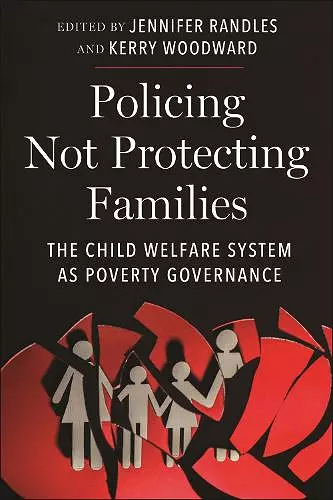Policing Not Protecting Families
The Child Welfare System as Poverty Governance
Jennifer Randles editor Kerry Woodward editor
Format:Paperback
Publisher:New York University Press
Published:11th Mar '25
Should be back in stock very soon

Controlling, surveilling, and punishing poor families through the child welfare system
In a typical year, one in five US children have some interaction with the child welfare system. Countless other families, particularly those who struggle to care for their children due to poverty or economic insecurity, fear child welfare system involvement. Though imagined as a system that protects children from caregivers’ maltreatment, contributors to Policing Not Protecting Families argue that the child welfare system polices and punishes poor parents who are unable to meet white, middle class parenting standards due to structural inequalities.
Bringing together scholars from anthropology, sociology, law, and social work, this collection is the first to critically examine the child welfare system’s role in governing poor, disproportionately Black and Native families. It shows that the child welfare system is a key site of poverty governance, or state control and management of poor families. Chapters bring together empirical research from diverse settings across the US, highlighting the system’s interactions with other state systems and its wide impact on marginalized families. Together the chapters illustrate the failure of the child welfare system to protect children and families from the structural inequalities that shape the lives of poor and other marginalized families.
Few state systems carry more power than child protective services, which determines whether parents permanently keep or lose their children. Yet, it has for too long escaped close examination. This timely and important collection explores how child welfare systems interact and intersect with a range of other institutions and social problems—too often worsening the outcomes for the families they purport to help. * Jennifer A. Reich, author of Fixing Families: Parents, Power, and the Child Welfare System *
This is the book our field has been waiting for. Policing Not Protecting Families ties together an analysis of the history and present functioning of the child welfare system, and larger questions of poverty governance in the United States. It views the child welfare system as one of many state systems that manage, surveilles and punishes disproportionately poor Black and brown populations, and examines the interrelations, both theoretical, and day-to- day practical, between the child welfare and other forms of policing. The book’s final section offers different, competing views on paths forward, ensuring that this work can be translated into concrete action. * Mical Raz, author of Abusive Policies: How the American Child Welfare System Lost Its Way *
Policing Not Protecting Families is an eye-opening and uniquely interdisciplinary interrogation of this country’s child welfare system. This incisive book conceptualizes the contemporary child welfare – or rather, family policing - system as both a continuation of the racialized and gendered family separation practices that forged the modern United States and as a central cog in the machinery of neoliberal poverty governance. Captivating, capacious, and empirically rich, these deeply researched case studies interweave to issue a vivid indictment of the systems supposedly in place to protect families. Moreover, they reveal the limits of policy reforms and illuminate the need for a radical re-envisioning of what it takes to keep families safe, whole, and thriving. * Hana E. Brown *
Policing Not Protecting Families is a timely and essential contribution to understanding the failures of our current child welfare (family policing) system and to reimagining alternative and effective paradigms for supporting families and protecting children. Authors across disciplines contextualize the devastating effect of half a century of neo-liberal poverty governance on marginalized and racialized families. They identify how government surveillance and intervention has focused on blaming parents for individual and economic failure rather than recognizing and solving the vast structural inequalities in their lives and the cumulative disadvantages these families face. The proffered solutions allow us to imagine how all families can be supported and children can live safely and well. * Jane M. Spinak, author of The End of Family Court: How Abolishing the Court Brings Justice to Children and Families *
ISBN: 9781479820610
Dimensions: unknown
Weight: 635g
392 pages